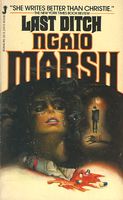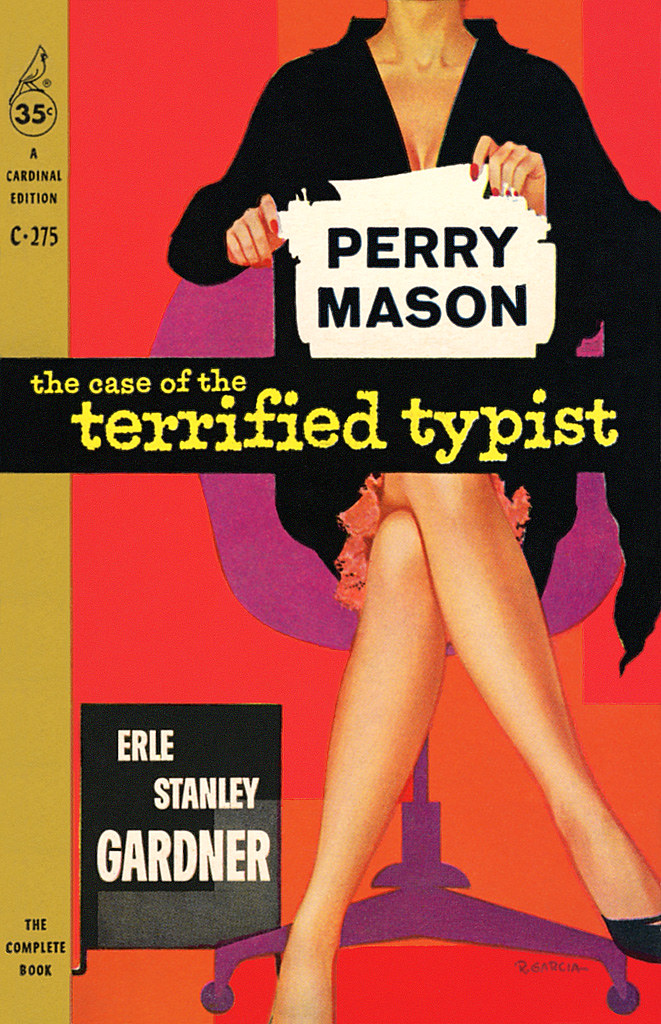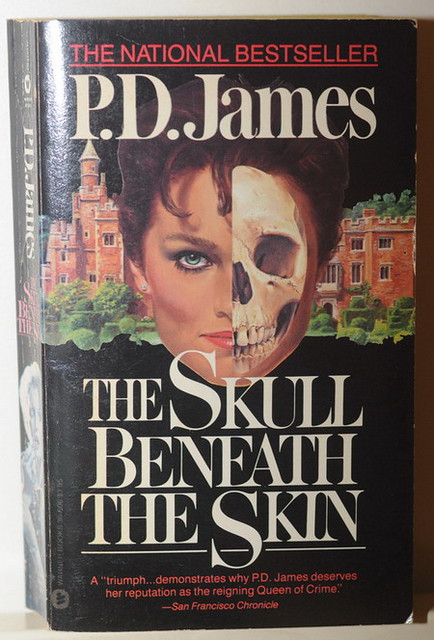This is the first of a trilogy. The second is The Well of Ascension and the final book is The Hero of Ages. I'll read and review them all here.
Brandon Sanderson is the author of the fantasy novel Elantris, which I really liked--I found it very memorable. He's also the co-author of the final Robert Jordan books, written by Sanderson from Jordan's notes that he (Jordan) left behind after his death (from cancer, I believe). Brandon Sanderson is the real deal of fantasy writers--he creates detailed, full-bodied worlds that the reader can get completely lost in.
First, let me say that this book is LONG--over 650 pages--and the two following books are even longer. So it's a time commitment--or a delicious promise, however you happen to look at it.
When I first encountered this book, somewhere I read that its premise went something like this: what if the hero went to conquer the darkness and the darkness won? That "what-if" stayed in my imagination for months (this book sat on my shelf waiting for me for awhile), and it is indeed the question that Brandon Sanderson addresses in this trilogy. In the Mistborn series, Sanderson has created a dark and magical world of nobles and slavery and he peoples this world with powerful and interesting characters.
It took me about 200 pages to get into this story--I'd actually started it before (over a year ago) and couldn't quite get hooked. I think that those 200 pages, in which the story and the characters and the complicated magical system are all introduced, were just a little too technical--or something--to capture my interest right away. I don't always have the patience for all the little details of a new world and its politics and magics--do I just lack the attention span of a true sci-fi/fantasy nerd? I don't know, but this time I powered through that beginning and the story finally grabbed me; now that I'm finished I can't wait to read the next one! I highly recommend this book.
Bad language: none
Sex: none
Tuesday, June 18, 2013
Tuesday, June 4, 2013
Last Ditch by Ngaio Marsh
 As you probably already know, Ngaio Marsh has been compared
to Agatha Christie—some say she’s even better than the famous and prolific
Christie. I love them both and find Marsh’s mysteries to have a little more
“bite” than Christie’s, but quite a bit less “bite” than those by P.D. James. I
really like all of these authors and am completely enjoying the Ngaio Marsh
mysteries I’m reading lately.
As you probably already know, Ngaio Marsh has been compared
to Agatha Christie—some say she’s even better than the famous and prolific
Christie. I love them both and find Marsh’s mysteries to have a little more
“bite” than Christie’s, but quite a bit less “bite” than those by P.D. James. I
really like all of these authors and am completely enjoying the Ngaio Marsh
mysteries I’m reading lately.
In this book we meet the son of our urbane and intelligent
Inspector Alleyn, young Ricky Alleyn, who finds himself involved with a
captivating lady, a repulsive artist, an oily landlord and a murdered
horsewoman, all on an idyllic British Island off the coast of France where
Ricky has gone to write. (How’s that for
a one sentence summary!!)
I liked Ricky immensely and, of course, who isn’t a little
in love with Roderick Alleyn? The story was pleasantly convoluted and the
supporting characters were interesting and, in some cases, satisfyingly
offensive. I really liked the book.
Bad language: none
Sex: none
Sex: none
P.S. I always try to find pictures of the actual covers from the books I read. Sometimes they're harder to find than others. It was a little difficult to find a picture of this one (I'm too lazy to take my own photos), but here it is! This cover must have been, I imagine, from the original printing of the book--it looks so very 70s, doesn't it?
The Essential Haiku: Versions of Basho, Buson & Issa edited by Robert Hass
I LOVE poetry! I can’t write it to save my life, but I love
to read it. I especially love Haiku. They’re like little photographs, only
deeper and fuller in that I feel I can smell and touch the atmosphere they
create.
The Haiku form, according to this book, evolved in Japan
from both Japanese and Chinese poetry. It started as something quite different
from what we now know it as. This book contains histories of and haikus by
three famous poets: Basho, Buson and Issa. Both Buson and Issa lived after and studied
the works of Basho.
I think I like Basho
best, but I really enjoy the haikus of all three poets. This is my favorite
book of poetry, although I love many others too. This collection is easy to read and full of
information about the haiku, these three poets, the difficulties of
translation, further reading, the prose of all three poets, and more. It’s an
extremely evocative book, making medieval Japan come alive in the reader’s
imagination. I feel steeped in beauty, freshness and the world of nature every time I read this
book. Highly recommended.
Bad language: Be aware that a few of these poems contain
earthy language—haikus deal largely with nature, and nature defecates, urinates,
copulates and is otherwise “natural”. Only 2 or 3 of these haikus have a little
of this and there are limited reference to such things in some of the prose. I
could wish that the translator had chosen more euphemistic words for some of
these actions, but I trust he chose as he thought best. In any case, it doesn’t
subtract from the transporting language of the vast majority of the prose and
poetry in this book.
Sex: see the caution above
Perry Mason: The Case of the Terrified Typist by Erle Stanley Gardner
Another Perry Mason
case—and this one he actually LOSES (gasp!). But don’t worry—he prevails in the
end and the good guys go free and the bad guys get what’s coming to them. And
that’s not a spoiler, of course, since we all know that every Perry Mason book
ends the same way—with everyone getting his or her just desserts and Perry Mason
coming out smelling like a rose.
In this one, Perry discovers a fantastic typist, only to
lose her a short time later in mysterious circumstances. Then he gets a client
who he can’t seem to get through to—could the client be lying? And is he somehow connected to the mysterious typist?
I like Perry Mason. I liked the TV show, I liked the TV
movies and I am liking the books. But this one was a little slower than the
others that I’ve read. There were quite a few legal explanations that I found a
little dry. Quite a few. Is it because of who the book is dedicated to? I am a
compulsive every-page reader, so I read the introduction and it was all about
some admirable lawyer guy and I wondered if he was the reason that Erle Stanley
Gardner (who is himself an attorney) filled this book with a bunch of
“lawyer-ese”. That stuff slowed me down
a bit.
However, the story was satisfying—and particularly involved,
with quite a few twists and turns. I
enjoyed it very much.
Bad language: Nope
Sex: Nope
Sex: Nope
I Capture the Castle by Dodie Smith
 I guess this could be called a “coming of age” story, in
that the main character, Cassandra Mortmain, grows in experience and wisdom
over the course of the year that she records in her journals. These journals, which the reader is allowed to share, are filled
with the voice of 17-year-old Cassandra, who starts her record as she and her family eke out a
living in their romantic and ramshackle English castle, and then ends it in
circumstances that have changed in every way.
I guess this could be called a “coming of age” story, in
that the main character, Cassandra Mortmain, grows in experience and wisdom
over the course of the year that she records in her journals. These journals, which the reader is allowed to share, are filled
with the voice of 17-year-old Cassandra, who starts her record as she and her family eke out a
living in their romantic and ramshackle English castle, and then ends it in
circumstances that have changed in every way.
At one point in her journal, Cassandra expresses her
preference for stories that are open-ended. A story that has a concrete end,
she says, is like a wall, closing off the reader from further thought of the
characters. This is a point of view
that, in theory, I think I disagree with. I really like all the i’s dotted and
t’s crossed in a book and an unsatisfying ending is one of the worst things to
be stuck with at the finish of a book, it seems to me. But this story is
open-ended in a way that allows the reader to dream up the lovely, hopeful
ending that seems hinted at, but is not yet fulfilled in Cassandra’s case. I
think I did like that and I understand what Cassandra means about that open
end. Hm.
In any case, it was a lovely and engaging book. Did you know that Dodie
Smith is also the author of “101 Dalmations”? I wonder what that book is really
like (as opposed to the Disney movie). Perhaps I will read it next. I certainly
enjoyed “I Capture the Castle and I highly recommend it.
Bad language: none
Sex: none
Sex: none
The Skull Beneath the Skin by P.D. James
I really like P.D. James! This is her second Cordelia Grey
mystery. Cordelia is a private investigator, so this book (unlike most of the P.D. James I've read) is not a police procedural.
Cordelia is
hired to protect her client’s actress wife (Clarissa) on a private island where
she (Clarissa) will star in a small play. Clarissa has been receiving
threatening letters for months and Cordelia’s job is to shield the high-strung
star from the letters—not the danger they threaten. Clarissa’s husband doesn’t
believe Clarissa’s life is in any danger—just her serenity. Suspense, murder
and danger follow.
I always know what to expect from P.D. James. She is expert
at picking apart her characters—their motivations, their feelings, their
reactions. Her mysteries are as much psychology as they are action. I find I
have to be in the mood for a P.D. James, but when I am, they are sublime.
Bad language: A few mild bad words, I think
Sex: Zero sex scenes. Clarissa and her friends are promiscuous, so infidelity and sensuality are referred to, but there are no descriptions—just the facts (and most of those are in the past).
Sex: Zero sex scenes. Clarissa and her friends are promiscuous, so infidelity and sensuality are referred to, but there are no descriptions—just the facts (and most of those are in the past).
Subscribe to:
Comments (Atom)



